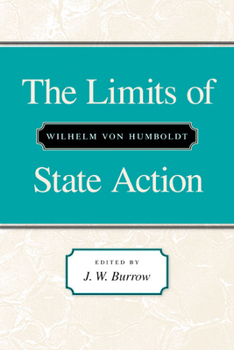The Limits of State Action
(Part of the Cambridge Studies in the History and Theory of Politics Series)
Select Format
Select Condition 
Book Overview
The Limits of State Action has an exuberance and attention to principle that make it a valuable introduction to classical liberal political thought. It is also crucial for an understanding of liberalism as it developed in Europe at the turn of the nineteenth century. Humboldt explores the role that liberty plays in individual development, discusses criteria for permitting the state to limit individual actions, and suggests ways...
Format:Paperback
Language:English
ISBN:0865971099
ISBN13:9780865971097
Release Date:May 1993
Publisher:Liberty Fund
Length:224 Pages
Weight:0.92 lbs.
Dimensions:0.7" x 5.9" x 8.9"
Age Range:18 to 10 years
Grade Range:Postsecondary to Grade 5
Customer Reviews
4 ratings
A true classic
Published by Thriftbooks.com User , 16 years ago
Liberty is at the heart of the Enlightenment experiment and the greatest question of our modern age (post-modernism not yet showing any lasting ability to transform societies). Humboldt was one of those men who championed the continuation of that experiment, to bring reason into human affairs, at a time when Europe began to move sideways into a love affair with Romanticism and folk culture. He also lived prior to the mass overturning of traditions that arose with the industrial revolution. Yet his well reasoned words still hold value in our materialistic, bureaucratic, and corporate world. This is a relatively faithful and accessible rendering of those words. They are worth savoring again and again, whether we love liberty from a left or right perspective, in order to understand that this yearning is part of the human condition. The desire to live one's life free of coercion, whether from majoritarian governments or quasi-private corporations or criminal enterprises masquerading as governments, is there inside our minds and hearts. If lovers of liberty keep that in mind, then the categories of left and right will seem less important and common ground seem more available. For in the end, as those thinkers of the past have pointed out, all lovers of liberty must ultimately stand together on the battlements and fight the good fight side by side, or they will find that liberty stolen from them.
this book does have a lot to do with libertarian socialism
Published by Thriftbooks.com User , 20 years ago
First off, if you are not sure what libertarian socialism is it is the left wing view that extends from left wing marxism through anarchism, and this book has a lot to do with the footholds of these views. With his speaking of "when work is external from the worker" and so on. and just his overall speaking of the need to strongly decrease the power of the state. He is not over concerned with "private rights", but writing this soo long ago he had no conception of what "private person" would be reinterpreted as. I think he would have agreed to limit these powers too, so it seems to me that he has a lot to do with libertarian socialism in a very indirect way
Humboldt and Mill: Classical Liberalism
Published by Thriftbooks.com User , 20 years ago
I feel a sense of responsibility and urgency to write this review in regards to what the only other reviewer of the Liberty edition has submitted: Wilhelm von Humboldt has nothing to do with "Libertarian socialism" - that statement is simply oxymoronic. Here is what Humboldt speaks to in this particular volume:1.) The development of classical liberalism in Europe at the turn of the nineteenth century.2.) The role of liberty in the development of the individual.3.) The necessary criteria to be met in allowing the state to limit individual actions.4.) The manner in which it is prudent to confine the state to its proper role.F.A. Hayek, who utterly rejected socialism, considered Humboldt to be Germany's greatest philosopher of freedom. Humboldt's purpose was to juxtapose the ancient ideals of a pursuit for excellence with the concept of negative liberty - which was later elucidated by Isaiah Berlin. If you are interested in the foundations of classical liberalism, I would suggest reading the works of Hayek, Humboldt, Hobhouse, Collingwood, Berlin, Oakeshott, and Mill. However, if you are interested in socialism I would recommend reading Marx, Proudhon, Feuerbach, Hegel, Rousseau, Richard Pipes' "Property and Freedom," Joshua Muravchik's "Heaven on Earth," and especially, "News from Nowhere," by William Morris.
insight into the philosophy of libertarian socialism
Published by Thriftbooks.com User , 24 years ago
In "The Limits of State Action" Enlightenment thinker Wilhelm von Humboldt describes the leading principle of his thought as being the essential importance of human development in its richest diversity - a principle that is not only undermined by the narrow search for efficiency through division of labour, but by wage labour itself. Humboldt espouses the libertarian view that whatever labour "does not spring from a man's free choice, or is only the result of instruction and guidance, does not enter into his very nature; he does not perform it with truly human energies, but merely with mechanical exactness"; when the labourer works under external control, "we may admire what he does, but we despise what he is."Essentially anticapitalist in its nature,"The Limits of State Action" provides insight into the philosophy of libertarian socialism, anarchy and educational reform. Fascinating reading.





